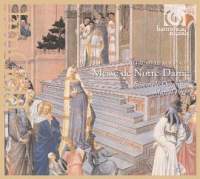Texte paru dans: / Appeared in: |
|
|
Outil de traduction (Très approximatif) |
|
|
|
|
|
Reviewer: J.
F. Weber Abbreviated: ... Pérès ... presents the Mass sung by eight voices (two to a part, more or less), the configuration that only Paul Hillier (13:5) has used among recent issues. The full Kyrie with nine invocations sung in Machaut's polyphony is included, thus performed previously only by Konrad Ruhland in a version otherwise marred by varied instrumental doublings. The chant Propers and Preface for the feast of the Purification of the Blessed Virgin (February 2) are inserted in the usual places, as Andrew Parrott (7:6, p. 88), Vellard, and several earlier versions furnished. The Mass uses no instruments, as only Parrott, Hillier, and Vellard have done in recent times. It is sung in a form of Latin pronunciation presumably used in fourteenth-century France, which Parrott and Hillier adopted in their own fashion. One word that strikes the ear oddly is “sanctum,“ the first syllable sounding like the verb “sang“ in English. The vocal production strikes me as utterly perverse in its renunciation of tonal beauty. “Bellow“ is a description that I can't avoid. Certain aspects of Pérès's interpretation must be heard, as for example his treatment of ex Maria virgine of the Credo, one voice executing a flourish on a prolonged note. Earp called the Vellard recording “markedly slow“; his Credo is 7:17, while Parrott and Hillier both come in well under six minutes, so I wonder what he will call Pérès's Credo, which is 9:37. The chant is taken from Reims, BM 264, a contemporary source such as Parrott (using Reims, BM 224) and Vellard (using an unspecified source) employed in their recordings. The singing is reminiscent of Pérès's Missa Pange lingua of Josquin des Prez (10:3, p. 44), where the director studied the writings of Jerome of Moravia but applied them in a way that would discourage any further interest in hearing chant as it might have been sung during the Renaissance. (His intervening recording of Ockeghem's Requiem included only two chant pieces, so the effect is not as pronounced.) The chant tempos are very slow and certain notes are made florid; without making a close comparison with the Josquin disc, it sounds as though Pérès has used the florid embellishment more sparingly than before. On the other hand, fortunately, Pérès in his recording of the Tournai Mass treated the chant in normal medieval chant style. In the Alleluia (but not in the Alleluia verse) of the present disc, we hear octave singing, a unique departure from the normal unison singing of the vocal ensemble throughout the Mass Propers. Pérès has frequently written annotations that furnish too little enlightenment on his interpretations. This time he indicates a number of ways in which he has found the correct style of performing this work, but I soon lost the thread of his explanation. His reference to ornamentation does, however, explain that flourish in the middle of the Credo. Texts come with three translations. I never cease to marvel at Marcel Pérès for his industry and the broad range of obscure materials that seize his interest, but this disc will not cancel Earp's declaration that “there is still room for the ideal recording of Machaut's Mass.“ ... | |
|
|
|
|
|
|
|
Cliquez l'un ou l'autre
bouton pour découvrir bien d'autres critiques de CD |
|
.jpg)



